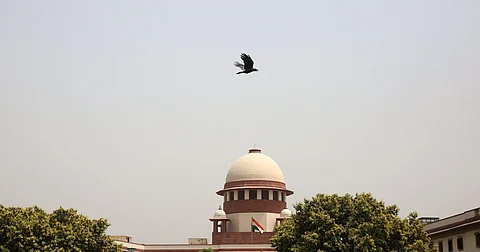

A PIL against certain sections of the Right to Education Act, 2009 for being “arbitrary and irrational”, which also went on to seek the introduction of a syllabus and curriculum that would be common for students across the country, was rejected by the Supreme Court on Friday, February 11.
A bench of Justices L Nageswara Rao and BR Gavai asked Ashwini Upadhyay, the petitioner advocate, to approach the high court instead. The bench also issued a clarification that it was not expressing any opinion on the case's merits. The matter was dismissed as withdrawn, as reported by PTI.
The bench also added that they have come after 12 years of the amendment.
It was senior advocate Ranjit Kumar who was appearing on behalf of the petitioner. The petition stated that what serves as huge obstacles in expounding the Constitution of India were the RTE Act's sections 1 (4) and 1 (5). Also, the absence of a common curriculum in the mother language leads to fostering and perpetuation of ignorance.
The PIL went on to state that it is the union's duty to effectuate a common education system which it has failed to do, instead, it simply adopted the pre-existing National Curriculum Framework (NCF) of 2005.
Sections 1(4) and 1(5) were included by the centre to deny educational excellence to Vedic pathshalas, madrasas and those educational institutions that impart religious instruction, the petition stated. The petitioner submitted that sections 1(4) and 1(5) offends Articles 14, 15, 16, 21 and 21A and is contrary to Articles 38, 39 and 46 and the Preamble itself.
The plea also mentioned that currently, the existing system doesn't provide equal opportunity to all children as the syllabus varies across different strata of society. The harmonious construction of Articles 14, 15, 16, 21, 21A with Articles 38, 39, 46 confirms that the most basic right of any child is education and that there can be no discrimination against this, even by the state, it stated.
“Right of a child should not be restricted only to free education but must be extended to have equal quality education without discrimination on the ground of child’s social economic and cultural background. Therefore, the Court may declare Sections 1(4) and 1(5) arbitrary, irrational and violative of Articles 14, 15, 16 and 21 and direct the Centre to implement common syllabus and common curriculum for the students of I-VIII standard throughout the country,” the plea said, as per a report in PTI.
To achieve a code of common culture, remove disparity and depletion of discriminatory values in human relations, the petition mentioned that a common minimum education programme for children up to 14 years could go a long way.
